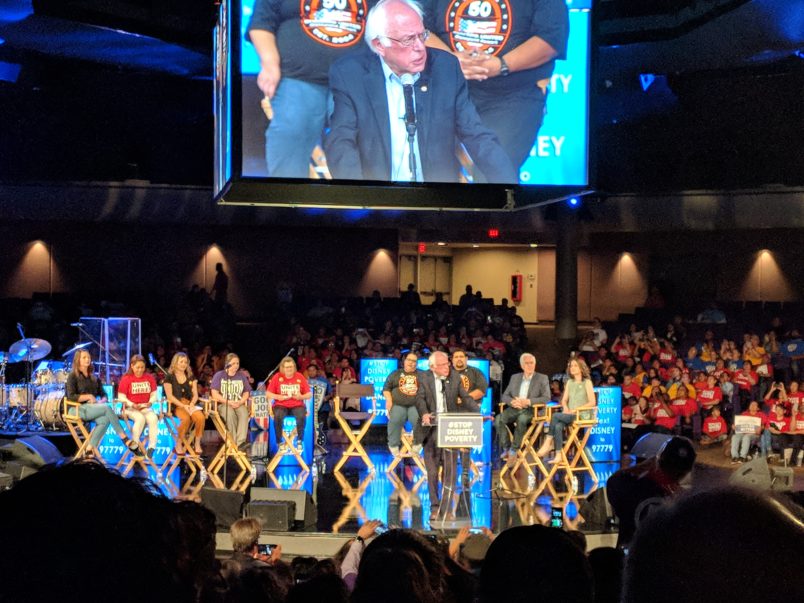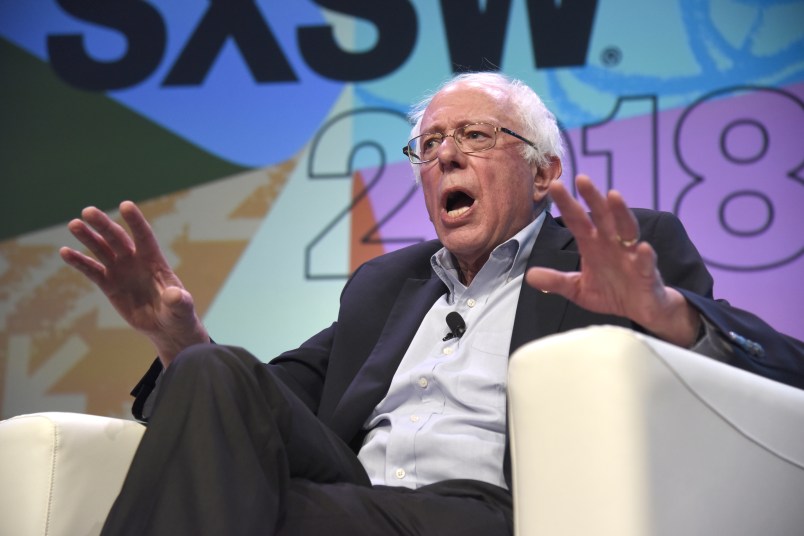ANAHEIM, CALIF. — Sen. Bernie Sanders (I-VT) strode to the stage to raucous applause in pivotal Orange County on Saturday, just days ahead of California’s crucial primaries — and lit into Big Mickey Mouse while ignoring the looming elections.
“If a corporation like Disney has enough money to pay its CEO over $400 million in a four year period, it damn well has enough money to pay its workers at least fifteen bucks,” thundered the once and likely future presidential candidate, using his significant soapbox to tear into the Walt Disney Company on worker compensation to the delight of the thousands of union members gathered at a megachurch a short jaunt from Disneyland.
But he failed to mention even once the state’s impending primary elections, in which many of the assembled unions are working hard to ensure Democrats get on the general election ballot — and whose outcomes will play an outsized role in Democrats’ fight to win the House and stop President Trump’s agenda.
The appearance was vintage Bernie. He raged against the machine and championed workers and small-d democracy while largely ignoring the big-D Democratic Party. It was just one of three events across the Los Angeles area that day where he focused on movement politics and ignored Tuesday’s big primaries in nearby districts while barely mentioning President Trump — even though groups like the Service Employees International Union used the events to corral volunteers to knock on doors for the primary immediately afterwards.

Sanders has stayed out of most Democratic primary races, doing little to support a number of candidates who’ve embraced his populist calls for Medicare for all, free college and a $15 national minimum wage. When he has gotten involved in competitive primaries, his candidates have lost more races than they’ve won.
Sanders has endorsed in just nine competitive federal or statewide primary campaigns so far this election cycle, even as hordes of candidates have rushed to paint themselves as mini-Bernies across the country. Of those, just one Sanders-backed candidate has won a competitive House primary this year – and that was former Chicago mayoral candidate Chuy Garcia, who has a solid political base of his own in the city’s Hispanic community following his 2015 run for mayor and would have won without Sanders’ help.
Many other Bernie-backed candidates have gone down. Former Rep. Tom Perriello (D-VA) lost his primary to now-Gov. Ralph Northam (D) last year after Sanders held a rally for him. Former Philadelphia Deputy Mayor Rich Lazer (D) finished in third place in his bid for an open congressional seat in the city’s inner suburbs a few weeks ago after Sanders endorsed him. So did pastor Greg Edwards in a nearby House race, even though Sanders came into the district to hold a rally for him. Democrat Heath Mello lost the general election for Omaha mayor in spite of Sanders’ support. Marie Newman lost her primary challenge to moderate Rep. Dan Lipinski (D-IL) after Sanders endorsed her as well, though her bigger boosters were groups like EMILY’s List, and Sanders wasn’t as involved.
Sanders can also count Georgia Democratic gubernatorial nominee Stacey Abrams (D) and Pennsylvania Lieutenant Governor nominee John Fetterman (D) as candidates he endorsed that won their contested primaries. But both of them had statewide name recognition beforehand, and Abrams especially had broad-based backing from much of the Democratic establishment and other big-name endorsers.
On Tuesday, the House candidate who is arguably the closest to Sanders both personally and ideologically is expected to lose his race. Pete D’Alessandro, who ran Sanders’ Iowa efforts in the 2016 presidential primaries and was a senior staffer on his presidential campaign, is running in competitive primary in a swing Iowa House district. He badly trailed two other better-funded candidates in a recent public survey from a respected pollster. That comes even though Sanders held a rally for him earlier this years and cut a TV commercial for him, a rarity for Sanders.
D’Alessandro argued that the mere fact that he’s even a factor in the race is due to Sanders, whose backing helped him raise nearly half the $300,000 he’s brought in for the campaign.
“People like me and a lot of people around the country like me wouldn’t even be in the race if not for Bernie Sanders, and if we’re not in the race there would never have been a discussion for Medicare for all or a $15 minimum wage,” he told TPM Monday, saying he would never have been able to compete with one self-funding candidate and another with heavy establishment backing.
Beyond that, D’Alessandro said Sanders’ focus on movement-building rather than focusing primarily on the races needed to seize congressional control would pay more dividends in the long run.
“It’s a long game to him, it’s about the process, it’s about people being involved in the process, and that might explain why he’d much rather be talking to 12 union organizers who are actually organizing than the 30,000 foot view of ‘how many seats do we need to flip the House,'” he said.
Sanders is also backing Randy Bryce in his bid to win House Speaker Paul Ryan’s (R-WI) seat, former NAACP Chairman Ben Jealous in his uphill bid for Maryland governor, and Colorado state Rep. Joe Salazar (D) in his bid to be the state’s attorney general, as well as some down-ticket candidates, and is expected to endorse some like-minded incumbents in tough races this year.

It’s undeniable that Sanders’ populist progressivism matches the mood of much of the party base — and that his 2016 campaign played a major role in mainstreaming ideas once considered fringe. His views on health care, taxes and the minimum wage have become positions of many candidates. He’s long had an uneasy relationship with a party he’s never officially joined. But while Sanders hasn’t moderated his positions, he’s done more in recent years to support broad party causes than in the past, including his barnstorming the country to defend Obamacare when Republicans tried to repeal it even though he was one of the Senate Democrats who was most vocal in criticizing the bill from the left during negotiations over its passage before he eventually backed it.
During his California trip, while he didn’t vocally push for Democrats to turn out, he did agree to record a video for California state Sen. Josh Newman (D), who is facing a recall effort from GOP groups that has major implications for whether Democrats will have a supermajority in the state legislature.
Sanders’ team argued that his win-loss record in these primaries is an overly simplistic way to look at his impact on politics — and it is.
“When you go to Southern California, where the biggest concern right now is animating Democratic voters so they turn out and we don’t have two Republicans on the ballot, when you go there and you talk issues like the fact that Disney workers are grossly underpaid … That’s the conversation you want to be in the political ether,” Jeff Weaver, Sanders’ top political strategist, told TPM on Monday. “Everybody in California knows there’s an election Tuesday. But I don’t think people know why it’s important to vote in that election.”
That may not be fully accurate — many average people not at political events seemed surprised when TPM mentioned there was a primary, and early turnout numbers show that while Democratic enthusiasm is up from recent midterm primaries, Republicans are still outvoting Democrats by comfortable margins in the state.
It also overlooks all the candidates who embraced his policies who he hasn’t endorsed, including a handful in those same crucial California House races just down the road from his Saturday stops.
Many of those have been backed by Our Revolution, a group created by some top 2016 Sanders backers that has been much more eager to endorse but has struggled to push its candidates amidst ongoing internal turmoil. Our Revolution head Nina Turner did not return a call requesting comment on this story.
That includes candidates like Laura Moser, who is married to a top strategist from Sanders’ 2016 campaign. Sanders called it “outrageous” when the Democratic Congressional Campaign Committee leveled attacks against her in her House primary, but never endorsed even after Our Revolution did. Moser badly lost her primary runoff a few weeks ago to a more moderate candidate.
Nor did he endorse some others who have won — like Kara Eastman, a progressive who beat moderate former Rep. Brad Ashford (D-NE) in a primary upset last month. Sanders’ allies argue that shows how much his presence is felt even in races he hasn’t endorsed, which may be true — but ignores other close races where he might have made a difference.
Others who’ve embraced Bernie and gotten Our Revolution’s backing but not Sanders’ say while they’d love his support, they’re not surprised he’s avoided some messy competitive primaries.
“If you try to put yourself in his shoes there’s not a lot for him to gain by supporting someone in this primary,” Andy Thorburn, one of two self-funding Democrats running to replace retiring Rep. Ed Royce (D-CA), told TPM on Wednesday at an event in nearby Fullerton. “If he starts endorsing a lot of people, how far do you go? I didn’t expect him to be particularly active in the primary season.”
Weaver said Sanders’ limited endorsements are partly a result of a political team that’s shrunk from his 2016 campaign — and promised he’ll continue to ramp up his 2018 efforts as the election hits full swing a few months down the line.
“He does care about the issues. You do have to vet the people you endorse, and the people who’ve asked for endorsements is way longer than we could accommodate,” he said. “You’re going to see him all over the place in the general elections.”
After hearing heartbreaking stories from Disney workers who’d been left homeless and had to skip meals because of meager pay, Sanders offered a positive note on Saturday.
“They’ve got the money and they’ve got the power. But there is something we have that they don’t have. We have morality on our side and we have the people on our side,” he said. “When you have people in Washington, Trump and others, who are trying to divide us up… we know when we stand together we’re going to win here in Anaheim, we’re going to win all over the country.”
This cycle will test that hypothesis.






